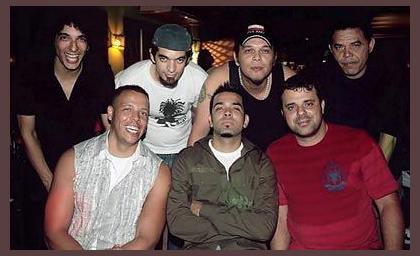 Mamelucos
Mamelucos
Mamelucos: A Journey Through Time and Controversy
Mamelucos, a highly acclaimed Portuguese music band, emerged in the late 1990s, captivating audiences with their distinct blend of traditional folk and modern rock. Their signature anthem, "O Tempo do Meu Pai," became a timeless classic, resonating deeply with generations of Portuguese speakers.
Band Members and Challenges
The band's lineup consisted of the enigmatic vocalist Pedro Trigacheiro, the multi-faceted guitarist Nuno Rafael, the rhythmic powerhouse Pedro Alves on bass, and the dynamic drummer Rui Costa. Their path was not without its challenges. In the early days, they faced resistance from a music industry that favored more mainstream sounds. Undeterred, Mamelucos persevered, honing their craft and amassing a loyal following.
Controversies and Acclaim
Mamelucos' rise to prominence was accompanied by both controversy and acclaim. Some critics accused the band of exploiting traditional Portuguese music for commercial gain, while others praised their innovative approach and ability to bridge the gap between generations. Regardless of the discourse, Mamelucos' music continued to resonate with audiences, cementing their status as one of Portugal's most influential bands.
Discography
Mamelucos' discography spans several acclaimed albums, including:
* "Mamelucos" (1997): Their debut album, featuring the hit single "O Tempo do Meu Pai."
* "Só Não Gosto de Fado" (2000): A follow-up album that further solidified their unique sound.
* "Conversas da Treta" (2004): A pivotal album showcasing the band's maturity and experimentation.
* "Ao Vivo no Coliseu" (2007): A live album recorded at Lisbon's prestigious Coliseu dos Recreios.
Legacy and Impact
Today, Mamelucos remains a beloved and influential force in Portuguese music. Their enduring anthem, "O Tempo do Meu Pai," continues to be a staple of Portuguese culture, transcending generations and resonating with its nostalgic lyrics and poignant melodies. Mamelucos' legacy as musical pioneers and cultural icons is undeniable, leaving an indelible mark on the Portuguese music scene and beyond.
Mamelucos, a highly acclaimed Portuguese music band, emerged in the late 1990s, captivating audiences with their distinct blend of traditional folk and modern rock. Their signature anthem, "O Tempo do Meu Pai," became a timeless classic, resonating deeply with generations of Portuguese speakers.
Band Members and Challenges
The band's lineup consisted of the enigmatic vocalist Pedro Trigacheiro, the multi-faceted guitarist Nuno Rafael, the rhythmic powerhouse Pedro Alves on bass, and the dynamic drummer Rui Costa. Their path was not without its challenges. In the early days, they faced resistance from a music industry that favored more mainstream sounds. Undeterred, Mamelucos persevered, honing their craft and amassing a loyal following.
Controversies and Acclaim
Mamelucos' rise to prominence was accompanied by both controversy and acclaim. Some critics accused the band of exploiting traditional Portuguese music for commercial gain, while others praised their innovative approach and ability to bridge the gap between generations. Regardless of the discourse, Mamelucos' music continued to resonate with audiences, cementing their status as one of Portugal's most influential bands.
Discography
Mamelucos' discography spans several acclaimed albums, including:
* "Mamelucos" (1997): Their debut album, featuring the hit single "O Tempo do Meu Pai."
* "Só Não Gosto de Fado" (2000): A follow-up album that further solidified their unique sound.
* "Conversas da Treta" (2004): A pivotal album showcasing the band's maturity and experimentation.
* "Ao Vivo no Coliseu" (2007): A live album recorded at Lisbon's prestigious Coliseu dos Recreios.
Legacy and Impact
Today, Mamelucos remains a beloved and influential force in Portuguese music. Their enduring anthem, "O Tempo do Meu Pai," continues to be a staple of Portuguese culture, transcending generations and resonating with its nostalgic lyrics and poignant melodies. Mamelucos' legacy as musical pioneers and cultural icons is undeniable, leaving an indelible mark on the Portuguese music scene and beyond.